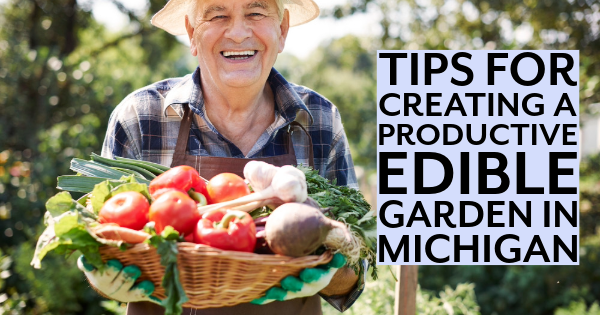
3 Things to Know About Planting Mums
August 4, 2025
Soil to Soul: Why Gardening Is Good for Your Mental Health
August 6, 2025Creating an edible garden in Michigan can be both a rewarding and sustainable way to enjoy fresh produce throughout the growing season. While Michigan’s climate has distinct seasons with cold winters and humid summers, careful planning and preparation will help you maximize your vegetable gardening efforts. In this blog post, we’ll explore practical tips to help you create a thriving garden that takes full advantage of Michigan’s unique seasonal conditions.
Start With Seasonal Planning and Crop Selection
The key to a successful garden in Michigan is planning. Research which crops thrive in Michigan’s climate, considering the shorter growing season and the potential for frost. Focus on cool-season crops like spinach, lettuce, peas, and carrots for early spring and late fall planting, and warm-season crops like tomatoes, peppers, and beans for summer. Start some seeds indoors early in the year to give your plants a head start. This seasonal approach will help ensure you get the most out of your garden and enjoy fresh, home-grown produce during the warmer months.
Design a Garden That Maximizes Space and Sunlight
The layout and design of your garden are essential to optimizing space and sunlight exposure. Raised beds are a great option in Michigan’s sometimes heavy, clayey soil, as they allow for better drainage and warmer soil temperatures in spring. Vertical vegetable gardening, such as using trellises for tomatoes or cucumbers, can help maximize your space. Michigan’s weather can also be unpredictable, so consider using row covers to protect tender plants from early frosts. Remember that in 2018, American gardeners spent a staggering 47.8 billion USD on their gardens and lawns, highlighting how much people value their outdoor spaces. Be mindful of sunlight—position sun-loving plants like tomatoes and peppers in the sunniest parts of your garden, while shade-loving crops like leafy greens can thrive in cooler, more shaded areas.
Focus on Soil Health for Maximum Yields
Healthy soil is the foundation of a productive garden, especially in Michigan, where the soil can vary from clay-heavy to sandy. Improving soil health should be a priority for gardeners. Adding organic matter like compost can enrich the soil with nutrients and improve its structure, ensuring your plants have the right environment for healthy growth. Practice crop rotation to prevent soil depletion and pest build-up. You can also use cover crops such as clover or winter rye during the off-season to protect and improve the soil, keeping it fertile for future planting seasons.
By following these tips and adjusting your approach to Michigan’s climate, you can grow an edible garden that yields fresh produce throughout the warmer months. The key to success is adapting to the seasonal changes by planning for early spring and late fall crops, maximizing space and sunlight, and maintaining healthy soil. With careful attention, you’ll be able to enjoy the benefits of home-grown vegetables while connecting with nature in your backyard. For more advice on how to get started with your Michigan garden, call us at Schwartz’s Greenhouse. Happy vegetable gardening!





